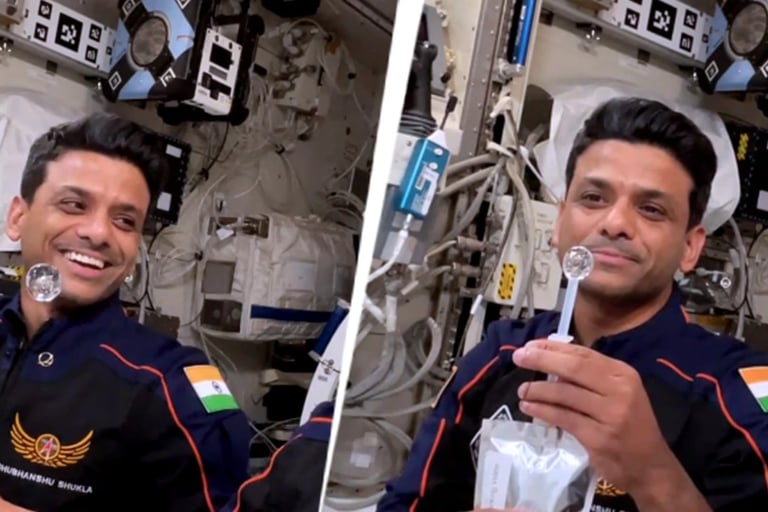Shubhanshu Shukla: India’s Giant Leap to the ISS
Join Shubhanshu Shukla as he floats among the stars, explores the ISS, and proves that dreams sprinkled with courage and curiosity can take you beyond the skies!
9/6/20254 min read


Imagine looking up at the night sky and knowing that one of your own is up there, orbiting Earth at 28,000 km per hour. On June 25, 2025, that imagination turned real when Group Captain Shubhanshu Shukla strapped into a spacecraft and launched toward the International Space Station (ISS).
For nearly four decades, India had waited for a moment like this—since Rakesh Sharma’s legendary flight in 1984. Now, Shukla wasn’t just visiting space; he was living there, conducting over sixty experiments, from studying how plants sprout in zero gravity to exploring futuristic materials and AI.
His mission was more than science—it was a story of dreams carried beyond borders, of a nation stepping into a new orbit of possibilities. Because in truth, “for those who dare to dream, the sky is not the limit—it’s only the beginning.”
Background
Shubhanshu Shukla’s story proves that even the biggest dreams can take flight from the smallest classrooms. Growing up in Lucknow, he gazed at the stars with the same curiosity every child feels—but unlike most, he never stopped asking “what if?”
From City Montessori School to the National Defence Academy, he carved his path with discipline and passion. As a fighter pilot, he flew India’s most advanced jets, gathering more than 2,000 flying hours, but his dream reached far beyond the skies. With an M.Tech in Aerospace Engineering from IISc Bengaluru, he combined knowledge with courage, preparing for challenges few dare to face.
In 2019, he was chosen for India’s Human Spaceflight Programme, and after years of intense training in Russia, Europe, Japan, and ISRO’s own facilities, he earned the chance to represent India in space. Finally, in June 2025, he became the first Indian in 41 years to step aboard the International Space Station, carrying with him not just science experiments, but the hopes of a billion hearts.
A Historic Milestone ✨
On 25 June 2025, history was written in the stars. Group Captain Shubhanshu Shukla boarded the Axiom Mission-4 (Ax-4), a privately managed mission to the International Space Station (ISS). With this flight, he became the first Indian to live and work aboard the ISS, and only the second Indian ever to travel to space—following the legendary Rakesh Sharma, who flew in 1984.
As the spacecraft lifted off, carrying him beyond the Earth’s atmosphere, Shukla wasn’t just representing India—he was carrying the hopes of a billion dreamers.
Life Aboard the ISS 🌍
For the next 18 days, Shubhanshu lived the life of an astronaut—floating in weightlessness, adapting to the vast silence of space, and looking down at Earth, glowing like a fragile jewel. But this wasn’t just about wonder—it was about science and service to humanity.
He took part in over 60 experiments across multiple disciplines:
Biology — studying how living cells behave in zero gravity.
Materials science — testing how metals and alloys perform beyond Earth.
Artificial Intelligence — helping design smarter systems for future space missions.
One of the most fascinating was the “Sprouts Project”, where he studied how plants grow without gravity. These findings could one day help astronauts grow food on long journeys to the Moon and Mars, and even solve farming challenges back on Earth.
During one of the biology experiments, tiny droplets of water escaped from their container and started floating around. Instead of panic, Shubhanshu and the crew laughed, chasing the droplets as they orbited the cabin. It was a playful reminder that zero gravity can turn even small things into a fun challenge.
Shubhanshu brought a small swan plush toy named Joy to act as a zero-gravity indicator. The moment it started floating, he cheered—it was a tiny, joyful sign that he had officially reached microgravity.
Beyond Shubhanshu: Dreaming Bigger Than the Stars 🌏🚀
Shubhanshu Shukla’s historic journey to the ISS is not just a personal achievement—it’s a beacon of possibility for young dreamers everywhere. His 18-day mission, conducting over 60 experiments in biology, materials science, and AI, is laying the foundation for future space missions—from lunar colonies to Mars exploration. Every task he completed in microgravity is a stepping stone for humanity’s next big adventure.
But the mission is also a lesson in teamwork and global collaboration. Working alongside astronauts from NASA and other international agencies, Shubhanshu showed that great achievements are never made alone. Space belongs to all of humanity, and every experiment, every floating droplet, and even the playful zero-gravity moments contribute to knowledge that benefits everyone on Earth.
For the youth, his journey is a powerful reminder: no dream is too big, no goal too distant. Whether you want to explore space, code the next breakthrough AI, or make the world greener, the same curiosity, courage, and perseverance that took Shubhanshu to the stars can take you far.
Shubhanshu’s story proves that the universe is not just out there—it’s a canvas for imagination, determination, and daring to dream. And for every young mind reading this, the message is clear: look up, aim high, and remember—the stars are only the beginning. 🌌✨
My Thoughts ✨
Shubhanshu Shukla’s journey to the ISS is a reminder that space exploration is not just about rockets and experiments—it’s about curiosity, courage, and the relentless pursuit of knowledge. Reading about his mission, the experiments he conducted, and even the light-hearted moments aboard the ISS, I feel a sense of pride and wonder for what humans can achieve when we push beyond limits.
Shubhanshu’s story is not just India’s triumph in space—it’s a source of inspiration for anyone who dares to dream, experiment, and explore.
What are your thoughts on Shubhanshu’s journey to the ISS?
How would you feel if you were part of this journey?
I’d love to know…
Until next time :)

